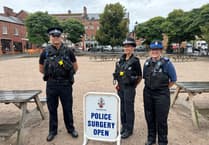Police and Crime Commissioner Alison Hernandez says she fears Devon and Cornwall could lose democratic oversight and public trust under government plans to scrap elected commissioners in favour of mayors and council leaders.
Following the Home Office announcement that police and crime commissioners (PCCs) will be abolished to save £100 million, Hernandez spoke to South Hams Newspapers, part of Tindle News Group, and was critical of what she described as “weak evidence” and “false economies” driving the decision.
“Firstly, if we were to have a Devon and Cornwall mayor planned for this area, I would be a lot less anxious because at least it’s a democratically elected person who will have oversight of policing,” she said. “What I’m really worried about is because we don’t have that and we don’t have agreement from our councils to go for a Devon and Cornwall mayor, we’re going to have potentially four leaders sitting in a room overseeing policing, and they’re going to appoint someone who’ll probably be paid the same as me, but will be unelected to actually do the job.”
“So I’m not quite sure the benefit of this alternative version, which is why I’d really like to see the government enforce that we have a mayor for Devon, Cornwall and the Isles of Scilly.”
Despite the uncertainty, Hernandez insisted that local policing services would not suffer in the short term. “I just want to reassure people that my team, I, and the Chief Constable will be working closely together to make sure we keep the police force running effectively and efficiently. Our oversight will continue.”
Her office, she said, plays a vital independent role in appeals against police complaints and misconduct panels. “All of this independence that we bring to the role will need to continue,” she said. “I will do everything in my power to make that continue for the next two and a half years.”
Asked what residents stand to lose from the abolition of PCCs, Hernandez pointed to both financial stability and public access. “I’ve overseen probably the most financially stable police force in the country through good financial prudence from my office. We haven’t done swingeing cuts or lost officers like other forces have.”
But it is the relationship with the public, she said, that may suffer most. “I don’t know any resident, other than someone who might be a friend of the Chief Constable, who would ever have the mobile number or the ability to directly communicate with him and get an answer,” she said. “I get people reaching out to me all the time – they need help, support, or just signposting. That sort of direct access is going to be harder.”
She also warned that localising decision-making could undermine collaborative projects such as Vision Zero, the cross-county road safety partnership she chairs. “It’s not parochial – it’s about the whole of the two counties and how we save people’s lives on the roads,” she said. “Now we’ll have individuals looking only at their small areas. The ability to see bigger, give good value for money, and actually save lives could all be at risk.”
When challenged on Devon and Cornwall Police’s past difficulties, Hernandez was quick to clarify that the force was no longer under special measures. “They came out earlier in the year, around June or July,” she said. “That has a lot to do with the confidence in the Chief Constable to deliver improvements. It’s not really about the police and crime commissioner – it’s about operational performance.”
She also addressed past scrutiny over her own record, including an investigation into her election expenses during her first term. “It wasn’t by our own police force,” she said. “I was cleared, and I’ve been re-elected twice since that happened.”
The Home Secretary, Shabana Mahmood, described PCCs as a “failed experiment”, suggesting the system weakened accountability, a claim Hernandez firmly rejects. “No,” she said. “The two pieces of evidence they’re using to remove this position are the weakest I’ve ever seen. One is a survey, done five years ago, on whether people knew who their commissioner was. The other is low election turnout – but we’ve been lobbying for years to hold our elections at the same time as local ones to improve turnout and reduce cost. They’ve refused to do it.”
Hernandez dismissed the government’s claim of £100 million in savings. “They think those savings come from cancelling the election,” she said. “You could just move our election, and it would cost hardly anything because it’s already being run for something else. That’s just a misnomer.”
She warned that the proposed system could end up costing the same. “They’re looking to set up these leaders with someone to do the job full time, who’ll cost the same as me,” she said. “I don’t see where the savings are going to be coming from.”
As for her own future once PCCs are abolished, Hernandez was non-committal. “I’ve got a job to do for the next two and a half years,” she said. “I want to make sure I’m focused on delivering. I was elected on behalf of the people of Devon, Cornwall and the Isles of Scilly to oversee policing – that’s my focus.”
She added that she would work to ensure democratic oversight survives in whatever form replaces the PCCs. “It helps with consent for policing,” she said. “People have put their faith in me, and I’ll do my best over the next two and a half years to make sure that isn’t lost.”





Comments
This article has no comments yet. Be the first to leave a comment.